Equality and Inclusion Report - Child Development Module, University
VerifiedAdded on 2021/01/02
|8
|1875
|236
Report
AI Summary
This report examines the critical importance of equality and inclusion within the UK, particularly in the context of child development. It defines key terms such as diversity, equality, inclusion, and oppression, and explores the significance of these concepts for creating a positive and supportive environment. The report analyzes relevant legislation and codes of practice, including the Equality Act 2010, the Childcare Act 2006, and SEND, emphasizing how these relate to the duties of a nursery assistant. It highlights the importance of supporting others to promote equality, inclusion, and diversity within the child development sector, explaining how inclusive practices encourage equality and support diversity. Furthermore, the report discusses the impact of discrimination on individuals, particularly children, and provides practical strategies for challenging discrimination in ways that promote positive change. The conclusion reinforces the importance of these factors in fostering a healthy and equitable society.
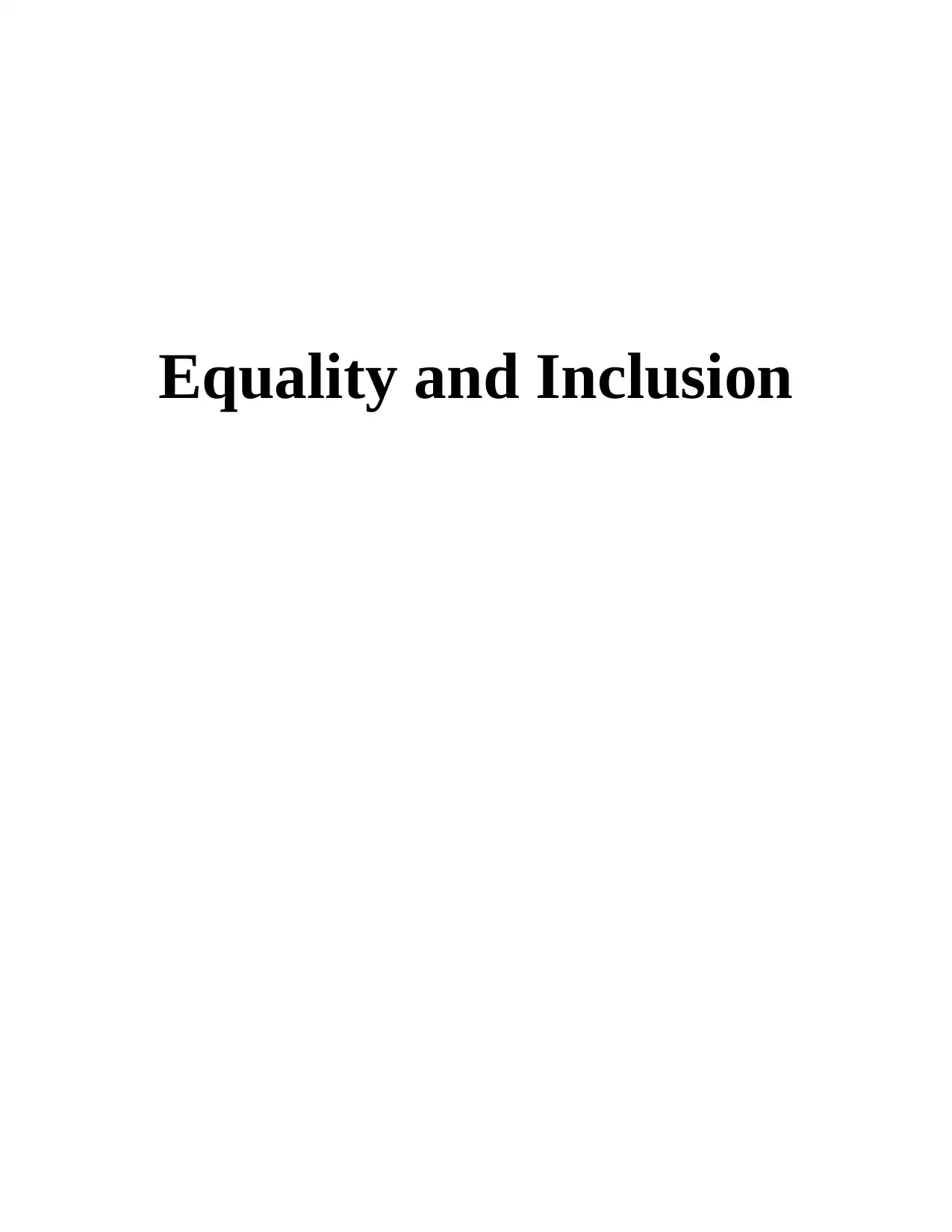
Equality and Inclusion
Paraphrase This Document
Need a fresh take? Get an instant paraphrase of this document with our AI Paraphraser
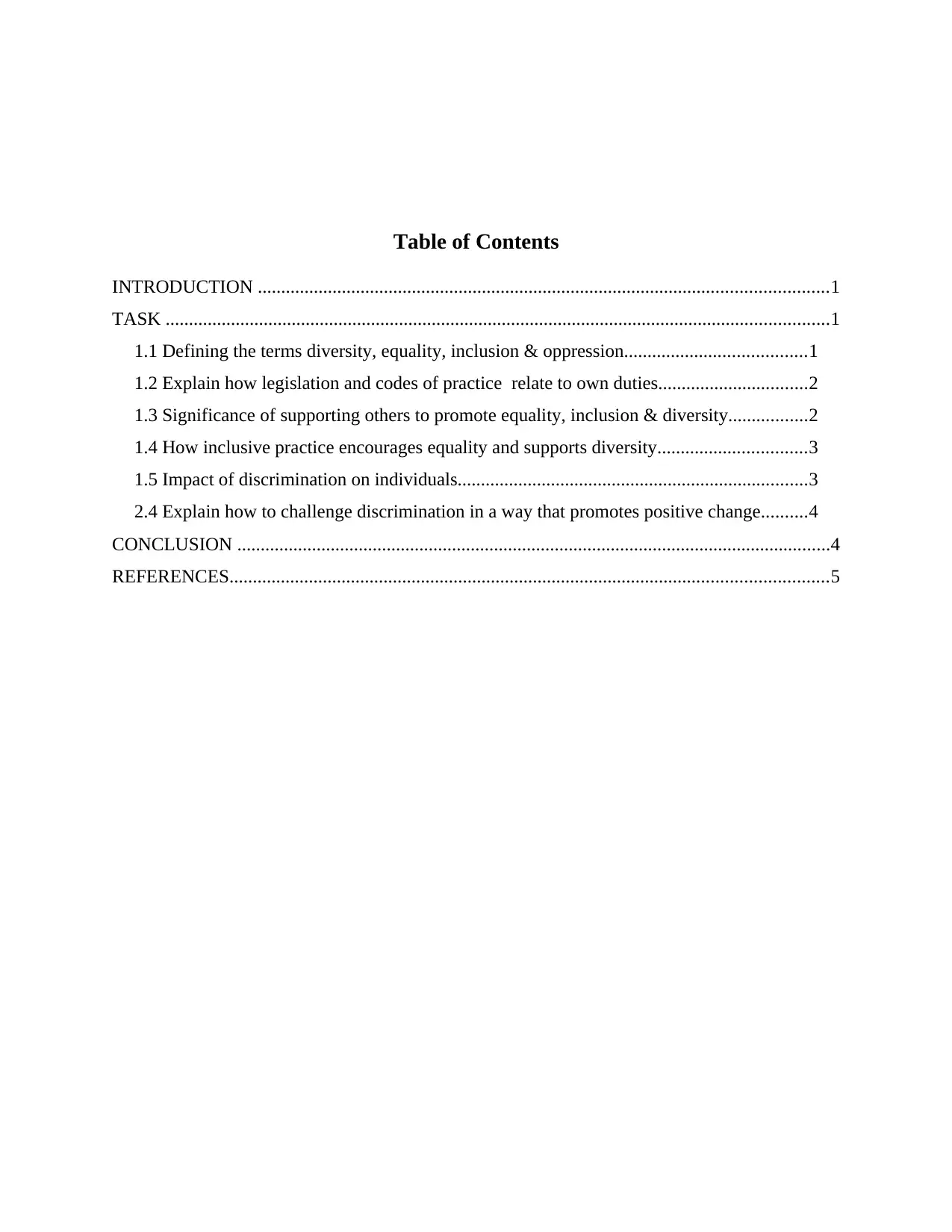
Table of Contents
INTRODUCTION ..........................................................................................................................1
TASK ..............................................................................................................................................1
1.1 Defining the terms diversity, equality, inclusion & oppression.......................................1
1.2 Explain how legislation and codes of practice relate to own duties................................2
1.3 Significance of supporting others to promote equality, inclusion & diversity.................2
1.4 How inclusive practice encourages equality and supports diversity................................3
1.5 Impact of discrimination on individuals...........................................................................3
2.4 Explain how to challenge discrimination in a way that promotes positive change..........4
CONCLUSION ...............................................................................................................................4
REFERENCES................................................................................................................................5
INTRODUCTION ..........................................................................................................................1
TASK ..............................................................................................................................................1
1.1 Defining the terms diversity, equality, inclusion & oppression.......................................1
1.2 Explain how legislation and codes of practice relate to own duties................................2
1.3 Significance of supporting others to promote equality, inclusion & diversity.................2
1.4 How inclusive practice encourages equality and supports diversity................................3
1.5 Impact of discrimination on individuals...........................................................................3
2.4 Explain how to challenge discrimination in a way that promotes positive change..........4
CONCLUSION ...............................................................................................................................4
REFERENCES................................................................................................................................5
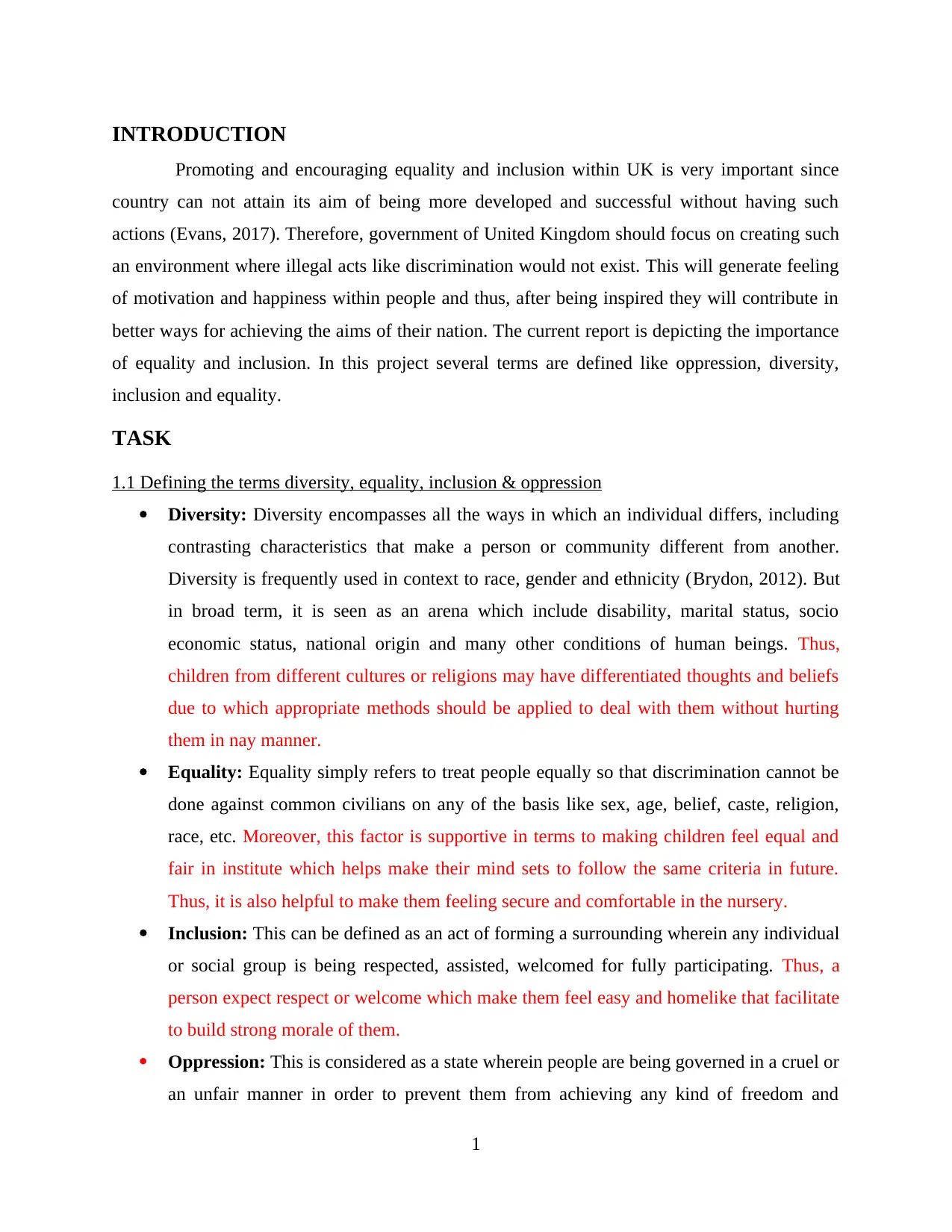
INTRODUCTION
Promoting and encouraging equality and inclusion within UK is very important since
country can not attain its aim of being more developed and successful without having such
actions (Evans, 2017). Therefore, government of United Kingdom should focus on creating such
an environment where illegal acts like discrimination would not exist. This will generate feeling
of motivation and happiness within people and thus, after being inspired they will contribute in
better ways for achieving the aims of their nation. The current report is depicting the importance
of equality and inclusion. In this project several terms are defined like oppression, diversity,
inclusion and equality.
TASK
1.1 Defining the terms diversity, equality, inclusion & oppression
Diversity: Diversity encompasses all the ways in which an individual differs, including
contrasting characteristics that make a person or community different from another.
Diversity is frequently used in context to race, gender and ethnicity (Brydon, 2012). But
in broad term, it is seen as an arena which include disability, marital status, socio
economic status, national origin and many other conditions of human beings. Thus,
children from different cultures or religions may have differentiated thoughts and beliefs
due to which appropriate methods should be applied to deal with them without hurting
them in nay manner.
Equality: Equality simply refers to treat people equally so that discrimination cannot be
done against common civilians on any of the basis like sex, age, belief, caste, religion,
race, etc. Moreover, this factor is supportive in terms to making children feel equal and
fair in institute which helps make their mind sets to follow the same criteria in future.
Thus, it is also helpful to make them feeling secure and comfortable in the nursery.
Inclusion: This can be defined as an act of forming a surrounding wherein any individual
or social group is being respected, assisted, welcomed for fully participating. Thus, a
person expect respect or welcome which make them feel easy and homelike that facilitate
to build strong morale of them.
Oppression: This is considered as a state wherein people are being governed in a cruel or
an unfair manner in order to prevent them from achieving any kind of freedom and
1
Promoting and encouraging equality and inclusion within UK is very important since
country can not attain its aim of being more developed and successful without having such
actions (Evans, 2017). Therefore, government of United Kingdom should focus on creating such
an environment where illegal acts like discrimination would not exist. This will generate feeling
of motivation and happiness within people and thus, after being inspired they will contribute in
better ways for achieving the aims of their nation. The current report is depicting the importance
of equality and inclusion. In this project several terms are defined like oppression, diversity,
inclusion and equality.
TASK
1.1 Defining the terms diversity, equality, inclusion & oppression
Diversity: Diversity encompasses all the ways in which an individual differs, including
contrasting characteristics that make a person or community different from another.
Diversity is frequently used in context to race, gender and ethnicity (Brydon, 2012). But
in broad term, it is seen as an arena which include disability, marital status, socio
economic status, national origin and many other conditions of human beings. Thus,
children from different cultures or religions may have differentiated thoughts and beliefs
due to which appropriate methods should be applied to deal with them without hurting
them in nay manner.
Equality: Equality simply refers to treat people equally so that discrimination cannot be
done against common civilians on any of the basis like sex, age, belief, caste, religion,
race, etc. Moreover, this factor is supportive in terms to making children feel equal and
fair in institute which helps make their mind sets to follow the same criteria in future.
Thus, it is also helpful to make them feeling secure and comfortable in the nursery.
Inclusion: This can be defined as an act of forming a surrounding wherein any individual
or social group is being respected, assisted, welcomed for fully participating. Thus, a
person expect respect or welcome which make them feel easy and homelike that facilitate
to build strong morale of them.
Oppression: This is considered as a state wherein people are being governed in a cruel or
an unfair manner in order to prevent them from achieving any kind of freedom and
1
⊘ This is a preview!⊘
Do you want full access?
Subscribe today to unlock all pages.

Trusted by 1+ million students worldwide
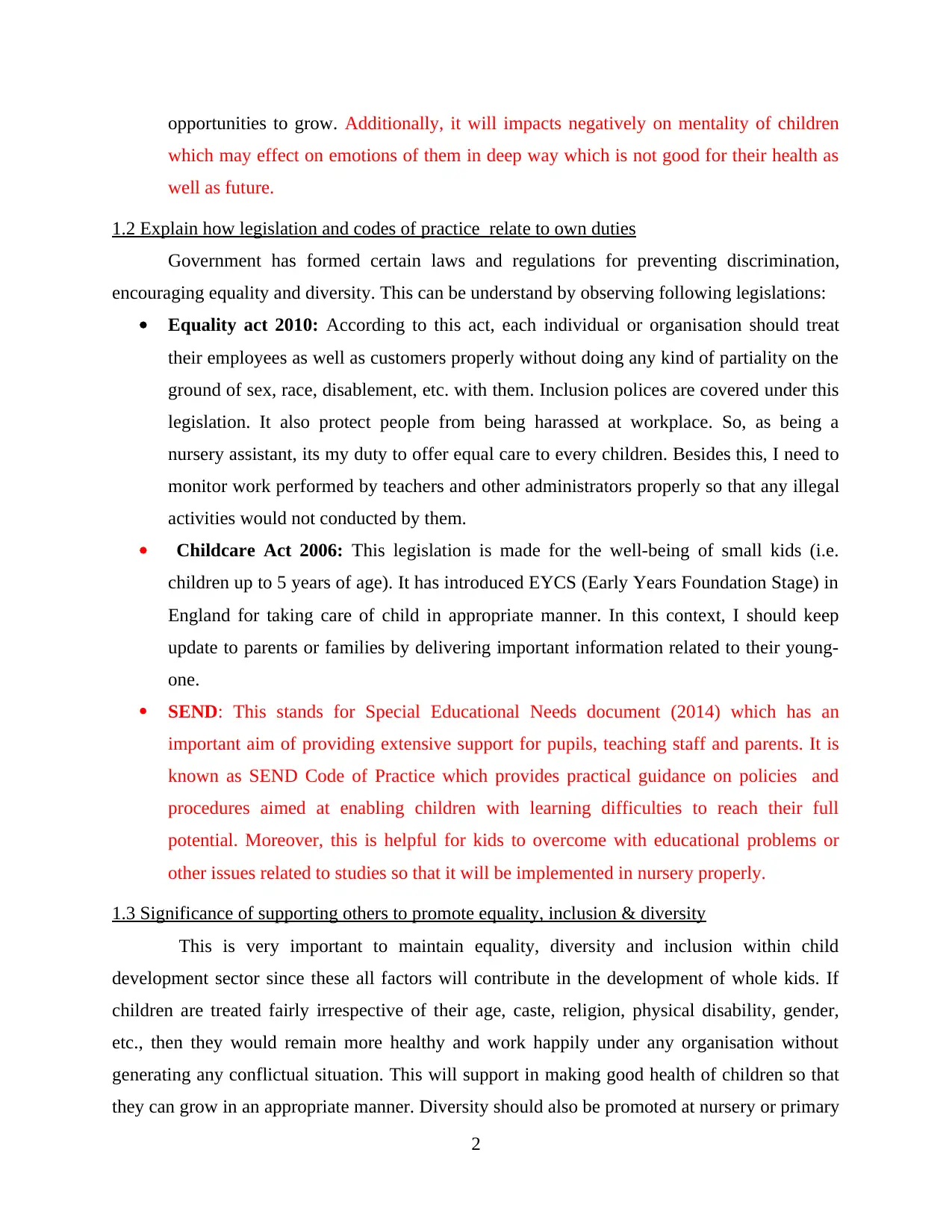
opportunities to grow. Additionally, it will impacts negatively on mentality of children
which may effect on emotions of them in deep way which is not good for their health as
well as future.
1.2 Explain how legislation and codes of practice relate to own duties
Government has formed certain laws and regulations for preventing discrimination,
encouraging equality and diversity. This can be understand by observing following legislations:
Equality act 2010: According to this act, each individual or organisation should treat
their employees as well as customers properly without doing any kind of partiality on the
ground of sex, race, disablement, etc. with them. Inclusion polices are covered under this
legislation. It also protect people from being harassed at workplace. So, as being a
nursery assistant, its my duty to offer equal care to every children. Besides this, I need to
monitor work performed by teachers and other administrators properly so that any illegal
activities would not conducted by them.
Childcare Act 2006: This legislation is made for the well-being of small kids (i.e.
children up to 5 years of age). It has introduced EYCS (Early Years Foundation Stage) in
England for taking care of child in appropriate manner. In this context, I should keep
update to parents or families by delivering important information related to their young-
one.
SEND: This stands for Special Educational Needs document (2014) which has an
important aim of providing extensive support for pupils, teaching staff and parents. It is
known as SEND Code of Practice which provides practical guidance on policies and
procedures aimed at enabling children with learning difficulties to reach their full
potential. Moreover, this is helpful for kids to overcome with educational problems or
other issues related to studies so that it will be implemented in nursery properly.
1.3 Significance of supporting others to promote equality, inclusion & diversity
This is very important to maintain equality, diversity and inclusion within child
development sector since these all factors will contribute in the development of whole kids. If
children are treated fairly irrespective of their age, caste, religion, physical disability, gender,
etc., then they would remain more healthy and work happily under any organisation without
generating any conflictual situation. This will support in making good health of children so that
they can grow in an appropriate manner. Diversity should also be promoted at nursery or primary
2
which may effect on emotions of them in deep way which is not good for their health as
well as future.
1.2 Explain how legislation and codes of practice relate to own duties
Government has formed certain laws and regulations for preventing discrimination,
encouraging equality and diversity. This can be understand by observing following legislations:
Equality act 2010: According to this act, each individual or organisation should treat
their employees as well as customers properly without doing any kind of partiality on the
ground of sex, race, disablement, etc. with them. Inclusion polices are covered under this
legislation. It also protect people from being harassed at workplace. So, as being a
nursery assistant, its my duty to offer equal care to every children. Besides this, I need to
monitor work performed by teachers and other administrators properly so that any illegal
activities would not conducted by them.
Childcare Act 2006: This legislation is made for the well-being of small kids (i.e.
children up to 5 years of age). It has introduced EYCS (Early Years Foundation Stage) in
England for taking care of child in appropriate manner. In this context, I should keep
update to parents or families by delivering important information related to their young-
one.
SEND: This stands for Special Educational Needs document (2014) which has an
important aim of providing extensive support for pupils, teaching staff and parents. It is
known as SEND Code of Practice which provides practical guidance on policies and
procedures aimed at enabling children with learning difficulties to reach their full
potential. Moreover, this is helpful for kids to overcome with educational problems or
other issues related to studies so that it will be implemented in nursery properly.
1.3 Significance of supporting others to promote equality, inclusion & diversity
This is very important to maintain equality, diversity and inclusion within child
development sector since these all factors will contribute in the development of whole kids. If
children are treated fairly irrespective of their age, caste, religion, physical disability, gender,
etc., then they would remain more healthy and work happily under any organisation without
generating any conflictual situation. This will support in making good health of children so that
they can grow in an appropriate manner. Diversity should also be promoted at nursery or primary
2
Paraphrase This Document
Need a fresh take? Get an instant paraphrase of this document with our AI Paraphraser
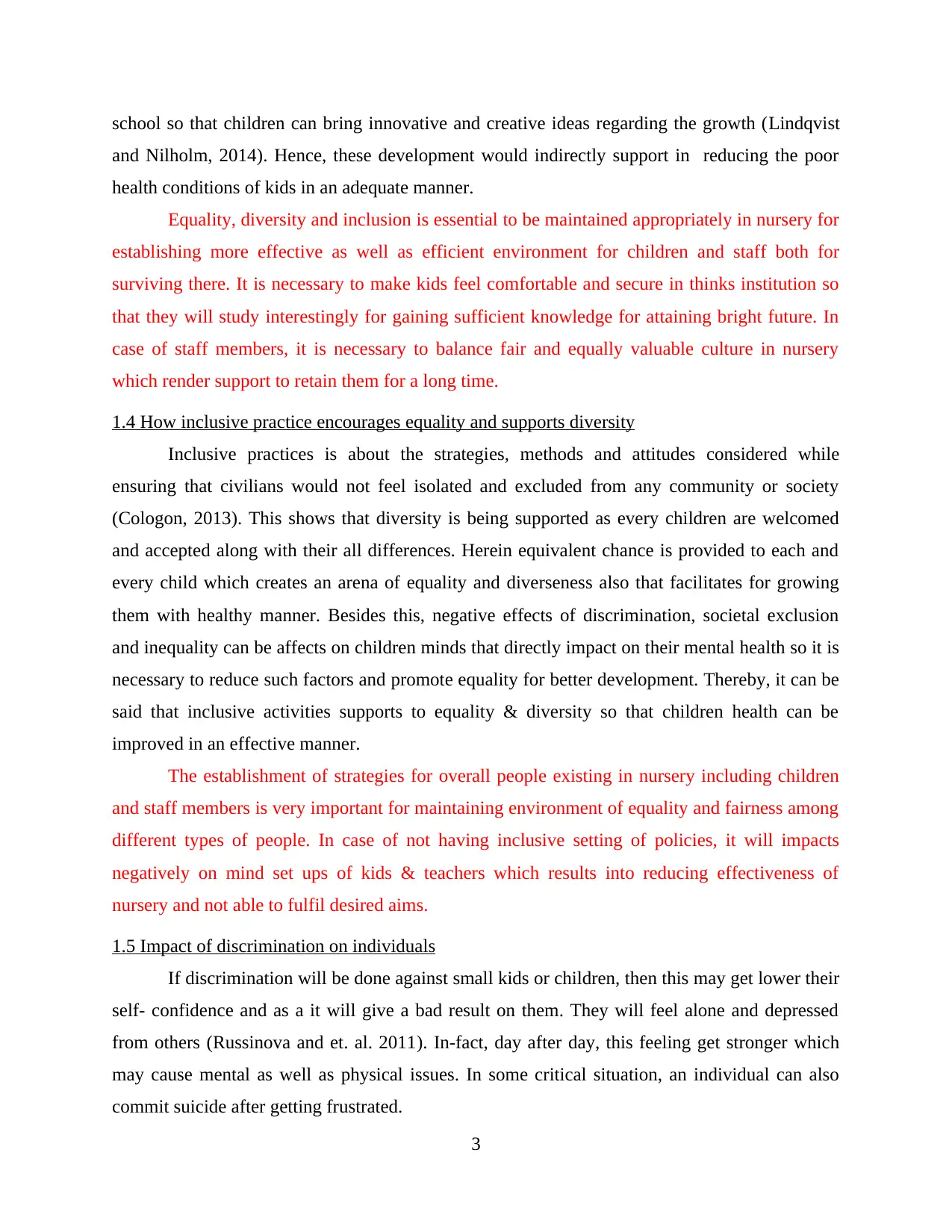
school so that children can bring innovative and creative ideas regarding the growth (Lindqvist
and Nilholm, 2014). Hence, these development would indirectly support in reducing the poor
health conditions of kids in an adequate manner.
Equality, diversity and inclusion is essential to be maintained appropriately in nursery for
establishing more effective as well as efficient environment for children and staff both for
surviving there. It is necessary to make kids feel comfortable and secure in thinks institution so
that they will study interestingly for gaining sufficient knowledge for attaining bright future. In
case of staff members, it is necessary to balance fair and equally valuable culture in nursery
which render support to retain them for a long time.
1.4 How inclusive practice encourages equality and supports diversity
Inclusive practices is about the strategies, methods and attitudes considered while
ensuring that civilians would not feel isolated and excluded from any community or society
(Cologon, 2013). This shows that diversity is being supported as every children are welcomed
and accepted along with their all differences. Herein equivalent chance is provided to each and
every child which creates an arena of equality and diverseness also that facilitates for growing
them with healthy manner. Besides this, negative effects of discrimination, societal exclusion
and inequality can be affects on children minds that directly impact on their mental health so it is
necessary to reduce such factors and promote equality for better development. Thereby, it can be
said that inclusive activities supports to equality & diversity so that children health can be
improved in an effective manner.
The establishment of strategies for overall people existing in nursery including children
and staff members is very important for maintaining environment of equality and fairness among
different types of people. In case of not having inclusive setting of policies, it will impacts
negatively on mind set ups of kids & teachers which results into reducing effectiveness of
nursery and not able to fulfil desired aims.
1.5 Impact of discrimination on individuals
If discrimination will be done against small kids or children, then this may get lower their
self- confidence and as a it will give a bad result on them. They will feel alone and depressed
from others (Russinova and et. al. 2011). In-fact, day after day, this feeling get stronger which
may cause mental as well as physical issues. In some critical situation, an individual can also
commit suicide after getting frustrated.
3
and Nilholm, 2014). Hence, these development would indirectly support in reducing the poor
health conditions of kids in an adequate manner.
Equality, diversity and inclusion is essential to be maintained appropriately in nursery for
establishing more effective as well as efficient environment for children and staff both for
surviving there. It is necessary to make kids feel comfortable and secure in thinks institution so
that they will study interestingly for gaining sufficient knowledge for attaining bright future. In
case of staff members, it is necessary to balance fair and equally valuable culture in nursery
which render support to retain them for a long time.
1.4 How inclusive practice encourages equality and supports diversity
Inclusive practices is about the strategies, methods and attitudes considered while
ensuring that civilians would not feel isolated and excluded from any community or society
(Cologon, 2013). This shows that diversity is being supported as every children are welcomed
and accepted along with their all differences. Herein equivalent chance is provided to each and
every child which creates an arena of equality and diverseness also that facilitates for growing
them with healthy manner. Besides this, negative effects of discrimination, societal exclusion
and inequality can be affects on children minds that directly impact on their mental health so it is
necessary to reduce such factors and promote equality for better development. Thereby, it can be
said that inclusive activities supports to equality & diversity so that children health can be
improved in an effective manner.
The establishment of strategies for overall people existing in nursery including children
and staff members is very important for maintaining environment of equality and fairness among
different types of people. In case of not having inclusive setting of policies, it will impacts
negatively on mind set ups of kids & teachers which results into reducing effectiveness of
nursery and not able to fulfil desired aims.
1.5 Impact of discrimination on individuals
If discrimination will be done against small kids or children, then this may get lower their
self- confidence and as a it will give a bad result on them. They will feel alone and depressed
from others (Russinova and et. al. 2011). In-fact, day after day, this feeling get stronger which
may cause mental as well as physical issues. In some critical situation, an individual can also
commit suicide after getting frustrated.
3
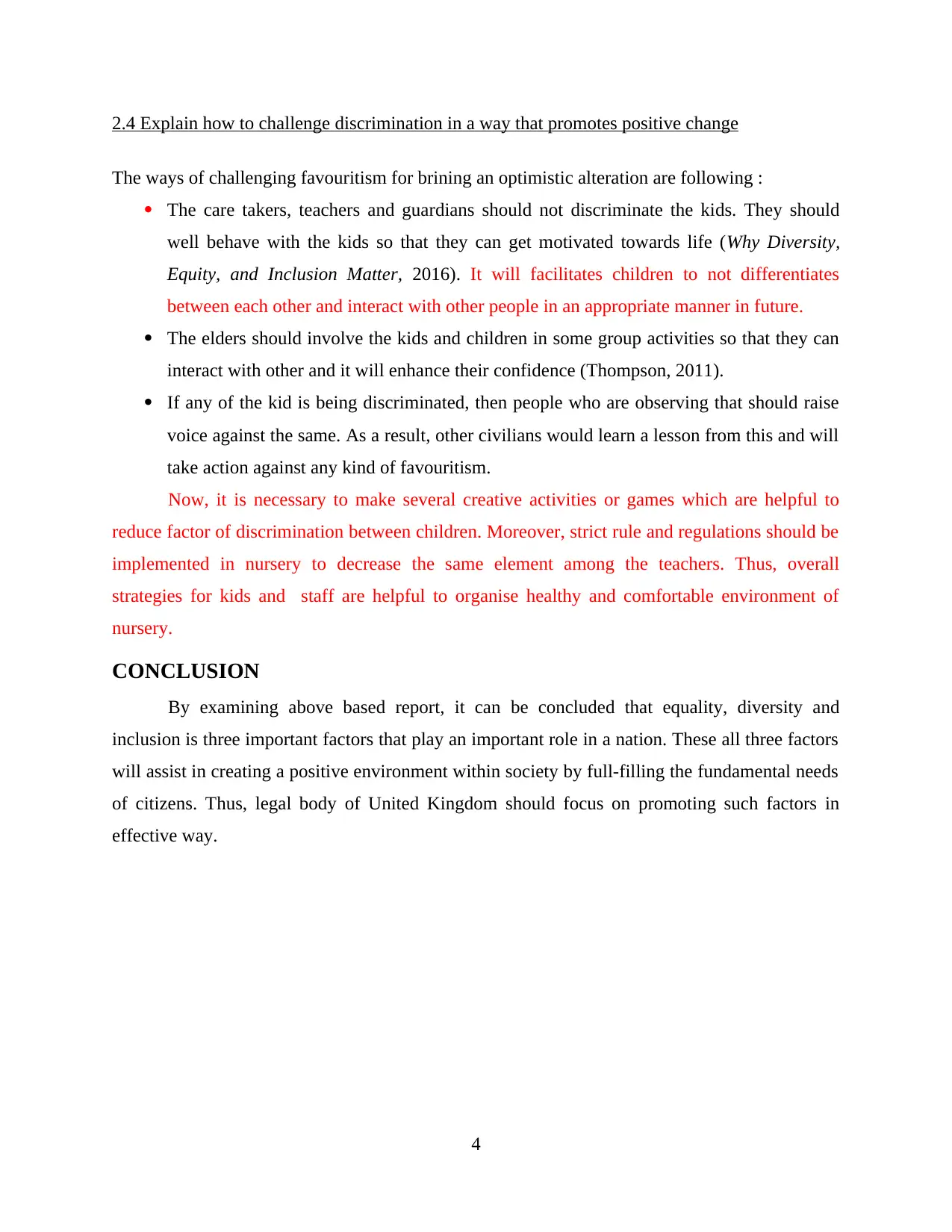
2.4 Explain how to challenge discrimination in a way that promotes positive change
The ways of challenging favouritism for brining an optimistic alteration are following :
The care takers, teachers and guardians should not discriminate the kids. They should
well behave with the kids so that they can get motivated towards life (Why Diversity,
Equity, and Inclusion Matter, 2016). It will facilitates children to not differentiates
between each other and interact with other people in an appropriate manner in future.
The elders should involve the kids and children in some group activities so that they can
interact with other and it will enhance their confidence (Thompson, 2011).
If any of the kid is being discriminated, then people who are observing that should raise
voice against the same. As a result, other civilians would learn a lesson from this and will
take action against any kind of favouritism.
Now, it is necessary to make several creative activities or games which are helpful to
reduce factor of discrimination between children. Moreover, strict rule and regulations should be
implemented in nursery to decrease the same element among the teachers. Thus, overall
strategies for kids and staff are helpful to organise healthy and comfortable environment of
nursery.
CONCLUSION
By examining above based report, it can be concluded that equality, diversity and
inclusion is three important factors that play an important role in a nation. These all three factors
will assist in creating a positive environment within society by full-filling the fundamental needs
of citizens. Thus, legal body of United Kingdom should focus on promoting such factors in
effective way.
4
The ways of challenging favouritism for brining an optimistic alteration are following :
The care takers, teachers and guardians should not discriminate the kids. They should
well behave with the kids so that they can get motivated towards life (Why Diversity,
Equity, and Inclusion Matter, 2016). It will facilitates children to not differentiates
between each other and interact with other people in an appropriate manner in future.
The elders should involve the kids and children in some group activities so that they can
interact with other and it will enhance their confidence (Thompson, 2011).
If any of the kid is being discriminated, then people who are observing that should raise
voice against the same. As a result, other civilians would learn a lesson from this and will
take action against any kind of favouritism.
Now, it is necessary to make several creative activities or games which are helpful to
reduce factor of discrimination between children. Moreover, strict rule and regulations should be
implemented in nursery to decrease the same element among the teachers. Thus, overall
strategies for kids and staff are helpful to organise healthy and comfortable environment of
nursery.
CONCLUSION
By examining above based report, it can be concluded that equality, diversity and
inclusion is three important factors that play an important role in a nation. These all three factors
will assist in creating a positive environment within society by full-filling the fundamental needs
of citizens. Thus, legal body of United Kingdom should focus on promoting such factors in
effective way.
4
⊘ This is a preview!⊘
Do you want full access?
Subscribe today to unlock all pages.

Trusted by 1+ million students worldwide
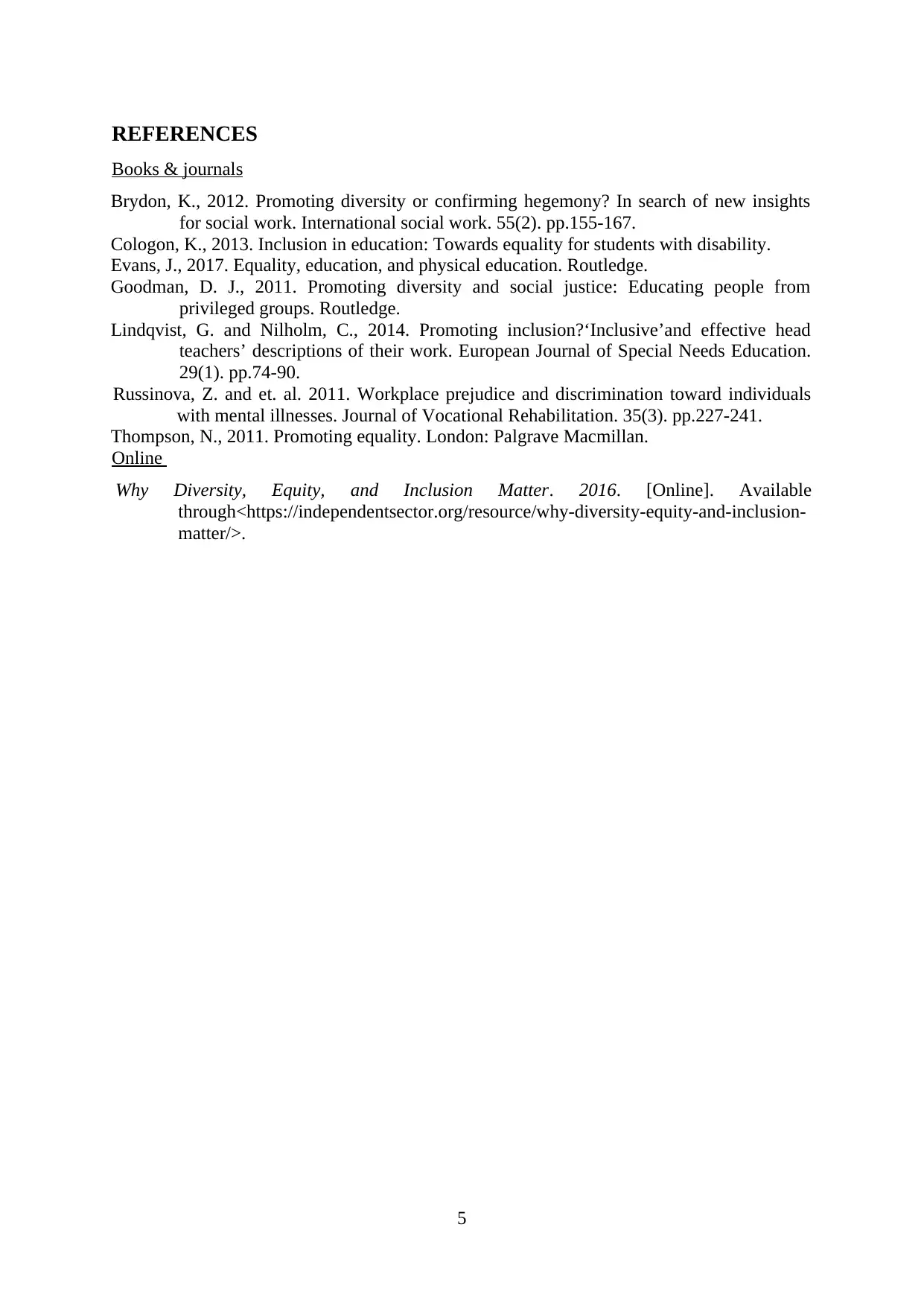
REFERENCES
Books & journals
Brydon, K., 2012. Promoting diversity or confirming hegemony? In search of new insights
for social work. International social work. 55(2). pp.155-167.
Cologon, K., 2013. Inclusion in education: Towards equality for students with disability.
Evans, J., 2017. Equality, education, and physical education. Routledge.
Goodman, D. J., 2011. Promoting diversity and social justice: Educating people from
privileged groups. Routledge.
Lindqvist, G. and Nilholm, C., 2014. Promoting inclusion?‘Inclusive’and effective head
teachers’ descriptions of their work. European Journal of Special Needs Education.
29(1). pp.74-90.
Russinova, Z. and et. al. 2011. Workplace prejudice and discrimination toward individuals
with mental illnesses. Journal of Vocational Rehabilitation. 35(3). pp.227-241.
Thompson, N., 2011. Promoting equality. London: Palgrave Macmillan.
Online
Why Diversity, Equity, and Inclusion Matter. 2016. [Online]. Available
through<https://independentsector.org/resource/why-diversity-equity-and-inclusion-
matter/>.
5
Books & journals
Brydon, K., 2012. Promoting diversity or confirming hegemony? In search of new insights
for social work. International social work. 55(2). pp.155-167.
Cologon, K., 2013. Inclusion in education: Towards equality for students with disability.
Evans, J., 2017. Equality, education, and physical education. Routledge.
Goodman, D. J., 2011. Promoting diversity and social justice: Educating people from
privileged groups. Routledge.
Lindqvist, G. and Nilholm, C., 2014. Promoting inclusion?‘Inclusive’and effective head
teachers’ descriptions of their work. European Journal of Special Needs Education.
29(1). pp.74-90.
Russinova, Z. and et. al. 2011. Workplace prejudice and discrimination toward individuals
with mental illnesses. Journal of Vocational Rehabilitation. 35(3). pp.227-241.
Thompson, N., 2011. Promoting equality. London: Palgrave Macmillan.
Online
Why Diversity, Equity, and Inclusion Matter. 2016. [Online]. Available
through<https://independentsector.org/resource/why-diversity-equity-and-inclusion-
matter/>.
5
Paraphrase This Document
Need a fresh take? Get an instant paraphrase of this document with our AI Paraphraser

6
1 out of 8
Related Documents
Your All-in-One AI-Powered Toolkit for Academic Success.
+13062052269
info@desklib.com
Available 24*7 on WhatsApp / Email
![[object Object]](/_next/static/media/star-bottom.7253800d.svg)
Unlock your academic potential
Copyright © 2020–2025 A2Z Services. All Rights Reserved. Developed and managed by ZUCOL.




